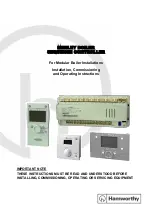
E5CS-X
E5CS-X
6
Operation
Temperature Setting
Press the temperature indication switching key until the SP indicator
lights. Then set the desired temperature value using the upward and
downward setting keys.
Alarm Setting
Press the temperature indication switching key until the AL indicator
lights. Then set the desired alarm value in units of
°
C or
°
F. If the
present temperature reaches the set alarm value, alarm output will
be enabled.
Sensor Failure
The error message “FFF” or “– – –” will appear on the main display if
the temperature sensor, such as the thermocouple or platinum re-
sistance thermometer, short-circuits or breaks. (Refer to
Error Mes
-
sages for details of the messages displayed.)
Note:
Neither the set alarm value is displayed nor the AL indicator
lights with the internal alarm mode selector switch set to 0
or 9. The alarm mode selector switch is provided inside the
housing, and is positioned differently on each model.
Function Setting
The various functions of the Temperature Controller are set using
the switches on the internal mechanism. To gain access to these
switches, the internal mechanism must be first drawn out from the
housing. Push the tab on the underside of the housing, and pull out
the mechanism.
Select the desired temperature range using the temperature range
selector switch (rotary DIP type). Eight or nine temperature ranges
can be selected depending on the model.
The set temperature is automatically changed when the tempera-
ture range is changed. Be sure to confirm the set temperature.
Temperature range selector switch
Alarm mode selector switch
Right side view
Temperature unit (C
°
or F
°
), where a choice is available, is selected
using pin 6 of the internal DIP switch which is also used for other set-
tings, such as the control mode and sensor compensation.
Internal DIP switch
Left side view
The procedures for making actual settings are given below.
Setting the Temperature Range
Set the desired temperature range by using the temperature range
selector switch (“Set no.” setting in the tables below). Eight or nine
temperature ranges can be selected depending on the model.
Thermocouple Type
The display can indicate temperatures 10% beyond each of the set
ranges.
Platinum Resistance Thermometer Type
Do not set the selector switch to “9.” Doing so will result in the error
message “FFF” or “– – –” being displayed.
Note:
1. The unit in which the temperature can be set is multiplied
by 10 when the temperature range is changed from 0.0
to 50.0 or 0.0 to 99.9 to a range in which the temperature
can be set in 1
°
units. Conversely, if the temperature
range is changed from one in which the temperature can
be set in 1
°
units to a range of 0.0 to 50.0 or 0.0 to 99.9,
the unit is decreased to 1/10 of the original unit.
2. The display can indicate temperatures 10% beyond
each of the set ranges.
Thermistor Type
Note:
1. The temperature range selector switch is factory-set to
“0.” With a temperature range, such as 50
°
to 150
°
C,
that exceeds the setting range, the indication unit is au-
tomatically adjusted to the minimum value. The set tem-
perature is displayed when power is turned ON.
2. The temperature range that can actually be indicated for
a set temperature range of –50
°
to 50
°
C is –50
°
to 60
°
C.
For other temperature range settings it is the full scale
±
10%.





























